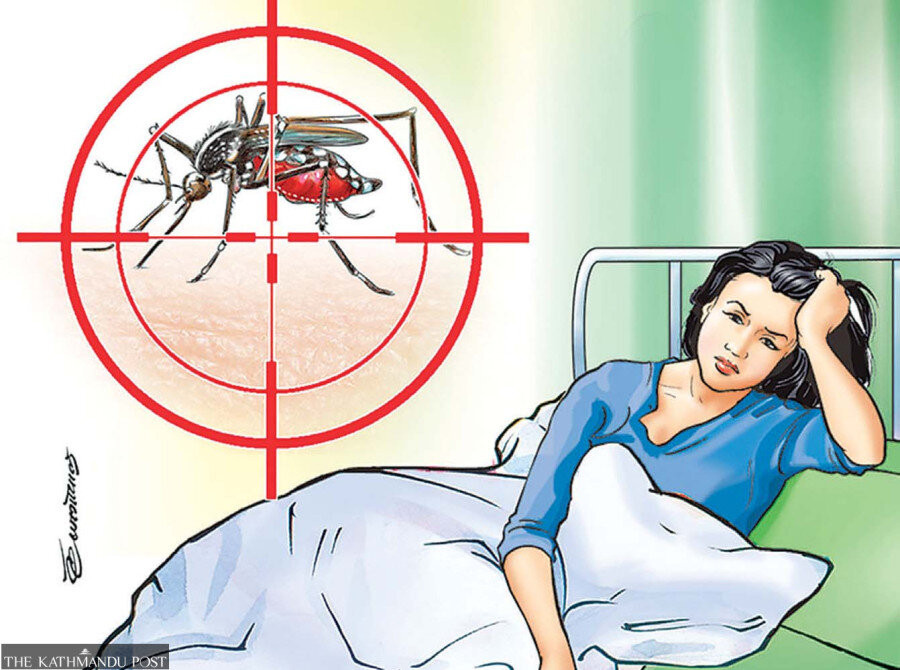Health
Dengue surge sparks critical blood shortage
Last week’s monsoon disaster and ongoing Dashain holidays have cut blood donations to 100 pints a day, while the demand is for around 400 pints.
Arjun Poudel
Ram Prasad Koirala, a resident of Nalagaun in Belkotgadhi Municipality, Nuwakot, spent all of Thursday racing around Kathmandu and Bhaktapur, desperately searching for platelets for his 13-year-old son, who has been infected with dengue.
Doctors at the Maharajgunj-based Tribhuvan University Teaching Hospital, where his son is being treated, told Koirala to get platelets as his son’s platelet count had dropped to a dangerously low count of 13,000 per microlitre of blood. A healthy count ranges from 150,000 to 450,000 platelets a microlitre.
“The doctors have asked me to arrange six pints of platelets, but I could manage only one pint,” a frustrated Koirala told the Post. “I spent the whole day visiting several blood banks across Kathmandu and Bhaktapur, but still couldn’t find donors.”
This was a common refrain among many relatives of seriously ailing dengue patients who had come to the Central Blood Transfusion Service (blood bank) in search of platelets, as hospitals in the Valley have been reporting a surge in dengue cases.
Officials at the central blood bank said that the demand for platelet-rich plasma and platelet concentrate has tripled compared to the usual daily collection.
“Demand for blood and blood components is about 400 pints a day, but we have been able to collect only around 100 pints,” said Sanjeev Kumar Yadav, senior technical officer at the Central Blood Transfusion Service. “We urge everyone eligible to step forward and donate blood. We have been struggling to meet the demand, and families of critically ill patients are in a difficult situation as they can’t find blood.”
Officials attributed last week’s monsoon disaster and the start of the Dashain holidays to the decline in blood collection. They say the closure of colleges for the Dashain holidays, along with many offices and organisations suspending blood donation campaigns due to the festival, has led to a sharp drop in donations.
“We are ready to travel to Nuwakot, Dhading and other adjoining districts of the Valley to collect blood, as we have no other option for saving lives,” said Yadav. “Relatives of patients, especially those with dengue, have been waiting at the blood bank round the clock.”
Officials at the blood bank are worried about a severe blood shortage, as colleges will not reopen until after the Chhath festival (first week of November), and many people will soon be leaving the Valley. They said there is already a daily demand for over 100 pints of platelet-rich plasma and platelet concentrate for dengue patients. As a single patient requires multiple pints, they lament that it is impossible to meet the demand at the current collection rate.
“We have also sought help from mainstream as well as social media for blood donations,” said Yadav.
Dengue is a mosquito-borne disease transmitted by female Aedes aegypti and Aedes albopictus mosquitoes. The same vector also transmits chikungunya, yellow fever, and Zika viruses, according to the World Health Organisation.
At least seven deaths and 14,975 infections have been reported from 76 of 77 districts across the country. Experts say reported dengue cases could be just the tip of the iceberg, as around 90 percent of the infected people do not show any symptoms.
The post-monsoon period is considered a high transmission season for dengue, but Nepal has witnessed outbreaks of the deadly disease since the beginning of the year and across the pre-monsoon, monsoon, and post-monsoon seasons.
According to doctors, mild to high fever, severe muscle pain, rashes, severe headache, and pain in the eyes are some symptoms of dengue.
The World Health Organisation says there is no specific treatment for severe dengue, but early detection and access to proper medical care can save lives.




 23.12°C Kathmandu
23.12°C Kathmandu















